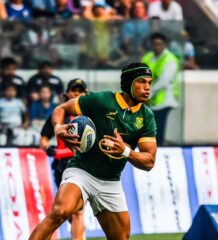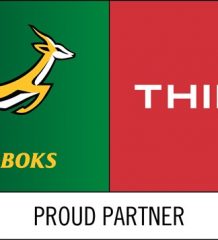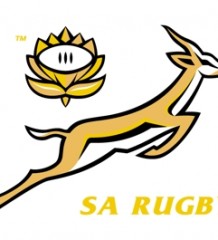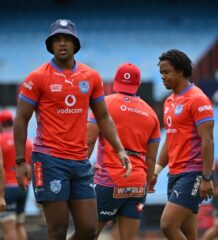Guma TAC explains terminiation at press conference
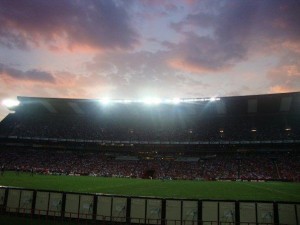 Johannebsurg 1 July 2011 “We have had the support of the Lions supporters and players throughout the process and we are sorry that we had to take a decision which is not good for the Lions.”, Guma chairman Robert Gumede said today while explaining why he and TransAfrica Capital chairman Ivor Ichikowitz were left with no other option but to terminate their attempt to save the struggling Golden Lions Rugby Union.
Johannebsurg 1 July 2011 “We have had the support of the Lions supporters and players throughout the process and we are sorry that we had to take a decision which is not good for the Lions.”, Guma chairman Robert Gumede said today while explaining why he and TransAfrica Capital chairman Ivor Ichikowitz were left with no other option but to terminate their attempt to save the struggling Golden Lions Rugby Union.
“We wanted to buy into the future, not get stuck in the past, Gumede explained. “But no business person can be expected to invest a lot of money, especially in a struggling business, without having a say in the operational decision-making.
“We will not be party to putting a veneer on transformation” Gumede said.
“The GLRU wanted our hard earned money, but wouldn’t allow Guma and TransAfrica Capital to work with them in mapping out their future path and direction.
“We expected road blocks, but not these kind of road blocks,” said Gumede.
Certain members of the GLRU executive have actively worked against the conclusion of this ground-breaking transformational transaction.
“Our insistence on ensuring that the Lions executive team be reconstituted and led by a CEO with a proven track record of turning around failed businesses has been met with resistance.”
“Given the history of the Lions’ bad handling of financial affairs as well as the level of investment (49,9%) that GumaTAC was committed to, we do not feel that our request to appoint the Chief Financial Officer and the Chief Commercial Officer nor the appointment of an independent tried and tested top drawer CEO, was unfair or inappropriate.”
Since the signing of the binding Memorandum of Understanding on 5 October 2010, GumaTAC has, in good faith, secured sponsorship running into several tens of millions of rands over the next three years. “These sponsors, who have bought into GumaTAC’s transformational agenda of the New Lions vision, will now have to decide whether to remain as Lions partners without GumaTAC and fundamental transformation no longer being part of the future,” Gumede said.
The deal was an opportunity for the struggling Lions, facing financial challenges, to get a much needed cash injection, to embrace change, real transformation, to attract new quality players, top business management, new spectators and bring back traditional supporters. “Regrettably the GumaTAC investment is being treated like a traditional ‘vendor financed’ BEE deal, where our money is good, but our involvement in working with the GLRU in mapping out the future path and direction, is not,” Gumede and Ichikowitz said in a letter, dated 27 June, to the South African Rugby Union.
GumaTAC walked a long road getting SARU’s consent for the Shareholders’ Agreement. This consent had only been made possible by Guma and TAC relinquishing their minority rights to accommodate the SARU constitution, notwithstanding that this was the basis upon which they were prepared to enter into this transaction from the start, as agreed by GLRU. The SARU approval was given on 9 June 2011. “Instead of celebrating the conclusion of the deal, we now find ourselves in a further situation of delays originating from the GLRU,” the letter to the GLRU states.
Over the past few months, GumaTAC avoided responding to media statements about moving the Lions from Ellis Park to the FNB stadium, which have put GumaTAC in a negative light as well as when the letter from SARU regarding the transaction approval was leaked to the media. “We decided to refrain from commenting because we felt further comment would damage the Lions’ brand.”
From the onset, GumaTAC did, however, publicly state that we would support a move to FNB stadium only if it made business sense. It bothered GumaTAC that such a move would lead to the Lions becoming a sub-tenant to Stadium Management Company,that is left with less than five years of its contract with the City of Johannesburg, leaving the Lions exposed. Other issues are sponsorship agreements that oblige the Lions to remain at Ellis Park. A further matter is the offer of R220million from Marc Group submitted to the GLRU to acquire Ellis Park. Considering the R540million the Government spent on upgrading the stadium to meet Fifa requirements, the stadium is worth much more. Such a desperate move to save the struggling union will leave the Lions without a very valuable asset.
Since early April 2011 Manie Reyneke, CEO of the Lions, had been provided with the relevant competition commission forms. He has on numerous occasions refused to sign these and on 16 May 2011 GumaTAC received an e-mail stating that he had been instructed by the executive committee of the GLRU not to sign any documentation until further notice. “Reasonably viewed, this condition is also incapable of being fulfilled,” the letter to SARU states.
“Rugby talks to the heart of our country – that’s were transformation should start. That’s why we wanted to play a part in transforming the Lions’ business, enabling the union to regain its former glory. But it is not only about trophies, we were going to drive development by introducing rugby in schools in townships like Soweto, but we were also going to bring back the traditional support base and lure black supporters. We’ve already embarked on signing quality international players and bringing back some who had left to play overseas.
“Through our involvement in the GLRU we wanted to make a contribution to true transformation, not only by investing our money, but also through our business skills and spurred on by our passion for the sport of rugby that, we believe, can be a powerful instrument in truly transforming our country, turning it into the real democracy we all desire.”
Stated Gumede: “We would like to thank the players, the technical team, supporters of the Lions and general rugby supporters for their support and appreciation for what we were doing for the Lions and rugby in general”.


